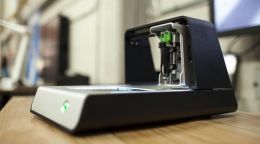International James Dyson Award won by Canadian student start up
Since it was founded in 2007 the Dyson Award has been a much coveted prize amongst engineering and design students and graduates.

On the 10th November it was announced that the winners of the International James Dyson Award are a team of Engineering students from the University of Waterloo in Ontario for their Voltera V-One custom circuit board printer. The design beat a record 710 entries from across 20 different countries to win the prize, with its designers taking $45,000, and the university’s engineering faculty awarded $7,500.
The Voltera V-One significiantly reduces the fabrication time for circuit boards by using conductive nano-silver ink dispensed by a compact electromechanical system, and a software algorithm to control it precisely. This enables circuit boards to be prototyped in just minutes.
Created originally as part of a 2013 design project, Voltera is the brainchild of Alroy Almeida, Katarina Ilic, James Pickard, and Jesús Zozaya. After graduating that same year, the team moved Voltera into a startup incubator run by the University of Waterloo.
“We’re lucky to have been encouraged and supported by the University of Waterloo,” said Jesús Zozaya. “As a startup, the university’s name has opened doors for us on a worldwide stage.”
“As students, we had the opportunity to experience different industries through the co-op programme, and as employers, we have a constant supply of high quality students that have proven invaluable to the development of the Voltera V-One.”
Pearl Sullivan, Dean of Waterloo Engineering commented, “The Voltera V-One printer pushes the boundaries of innovation. They took a very complex problem and came up with an elegant solution that would change customised circuit printing forever. The future of technology innovation in Canada lies within brilliant teams like Voltera.”
Alongside the Dyson prize, Voltera has also been named one of the top 10 innovations for 2015 by Popular Science, as well as the 2015 TechCrunch Disrupt (Hardware Battlefield) Champion and this year’s Make Magazine Editor’s Choice.
